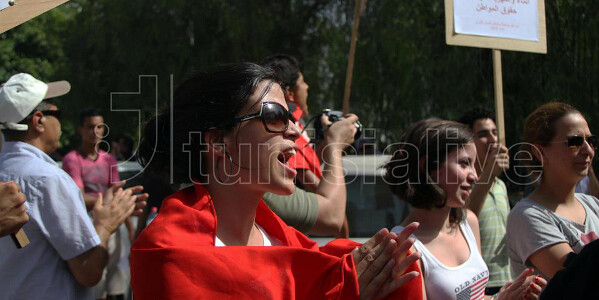Political Participation & Leadership
Source: TunisiaLive
Amid political strife, Tunisian women will celebrate national Women’s Day Tuesday, marking the 57th anniversary of the country's central piece of women's rights legislation, the Code of Personal Status.
The holiday has taken on a greater political significance in post-revolutionary Tunisia. This year, simultaneous pro- and anti-government demonstrations will take place in Tunis to commemorate the day.
Decreed in 1956, the Code of Personal Status is a series of laws aimed at reducing gender inequality by granting women specific rights. The code covered issues of adoption, marriage, divorce, child custody, and inheritance. It also abolished polygamy and guaranteed women the right to equal pay and education. The law is perceived as one of the most progressive women's rights laws in the Arab world. [display_posts type="related" limit="3" position="right"]
Although Tunisia's first president, Habib Bourguiba, institutionalized the law as part of his social policy, many believe that his successor, Zine el-Abidine Ben Ali, used the code and Women's Day to embellish Tunisia's image abroad.
"In the years of Ben Ali's regime, this day was used by the regime to improve the image of the country. Ben Ali would boast about giving women their rights when asked about the state of human rights and democracy in Tunisia. We at the Tunisian Association of Democratic Women [known by its French acronym ATFD] tried to introduce a different discourse than that of the regime by showing the limits and the drawbacks of the status code," ATFD President Ahlem Belhaj told Tunisia Live.
"Although the Code of Personal Status gave women plenty of rights, it lacked on other levels," Belhaj added. "Yes, we were one of the few Arab countries that banned polygamy. But the head of the family was still the father, and the society was patriarchal. During the celebration of Women’s Day, we worked on drawing attention to the laws that enforced discrimination, like the absence of inheritance equality. We tried to draw attention to the fact these laws only worked in theory but did not give women equality in practice."
The 2012 celebration of Women’s Day took on the feel of a protest amid legislative concerns about women's legal status. Thousands of women walked the streets not only to celebrate the day, but also to protest against an act in the draft constitution proposed by the ruling Ennahdha party that described women as complementary to men.
Belhaj emphasized the importance of celebrating national Women’s Day in post-revolution Tunisia, and highlighted its relevance to the political context. [display_posts type="same_author" limit="3" position="right"]
"Women’s Day is a day to evaluate the status of women and their rights in the country. Today, women’s rights are endangered by a new discourse that is invading Tunisian society, that of religious extremism," Belhaj claimed.
"The importance of celebrating Women's Day can be seen in its pertinence to the political context," she added. "In the political field, the presence of women is limited and restricted, which is to be considered when talking about women’s rights. Her rights are not separate from general rights, including political ones."
"This year, the national Women's Day also comes at a critical time," urged Belhaj. "We organized a march that will join Bardo to urge women to participate in these protests and sit-ins."

Women's Day demonstration, August 2012. Photo credit: Tunisia Live
While a coalition of feminist associations including ATFD are planning to march Tuesday to Bardo in celebration of Women's Day and in opposition to the current government, Ennahdha is organizing its own event called "The Women of Tunisia are the Pillar of the Democratic Transition and National Unity."
"We don’t want the celebration of Women’s Day to be used as part of an agenda or to serve the interests of a political party," said Ennahdha NCA member Fatoum Lassoued to Tunisia Live. "Women were exploited to embellish the image of the regime before. "
"There were concerns over the past two years regarding women’s rights," she added. "Yet the presence of women in the NCA is a guarantee that the women’s rights will be maintained and protected. Political parties should stop using women to serve their interests."
"This celebration should be an acknowledgment of women’s rights," Lassoued continued. "Women have played an important role in the independence of the country and the revolution. Tunisia has many women figures who have influenced its history. Women should be celebrated for their value."
